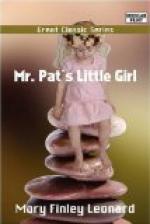All the evening she worked with feverish energy, writing labels for fruit jars and pasting them on, until no shadow of an excuse remained for not going to bed.
When at length she went to her room, it was to sit at the open window gazing blankly out into the darkness. She had been telling herself fiercely how silly and weak she was, but she had not succeeded in conquering her unhappiness. Now she resisted no longer.
She had not met Allan Whittredge face to face before for six years, although since his father’s death he had been frequently in Friendship. She had known it must happen sometime, and had schooled herself to think it would mean nothing to her, but instead it had brought back a host of vain regrets.
She had been happier of late. Association with those light-hearted children had brought back something of her old hopefulness. That a chance meeting with Allan Whittredge could change all this, humiliated her.
“You haven’t any pride, Celia Fair. It was your own doing.”
“I had to do it; it was forced on me.”
“And a fortunate thing it was. Do you suppose he would care now? These years which he has spent out in the world—what have they done for you? They have turned a happy-hearted girl into a bitter, disappointed woman.” So she argued with herself.
Resting her head on the sill, she let her thoughts go where they would.
“You are sure you won’t forget, Celia? It is going to be a long time,” Allan had said. She was still a schoolgirl, and he just through college, and no one but her father knew about it. Dr. Fair had shaken his head, but he loved Allan almost as much as he loved Celia. Allan must do as his mother wished and go abroad. Time would show of what stuff their love was made, he said.
She had been so happy. She had been glad no one knew. Her happiness was all her own.
Then had come Judge Whittredge’s illness, the trouble about the Gilpin will, and the cruel slander that had crushed her father. The brief letter with which she returned Allan’s letters and ring, was the result of her bitter resentment and grief. In her sorrow over her father’s death she told herself her love was dead, and for a time she believed it. Now she knew it was not so.
“At least, I will be honest with myself. I do care. Perhaps I shall always care. Oh, it is cruel to come so near happiness and miss it. But it is something to have come near it.
“O God, help me—” she prayed, “not to choose the desert way. I do not want to be bitter and hard.”
As she lay back in her chair, too weary to think; through her mind floated Rosalind’s words, “Things always come right in the Forest.”
* * * * *
It was after dinner. The sun had set, leaving the sky full of opal tints. The delicate leaves of the white birch barely moved, so still was the air. The whir of the last locust had died away, and the soft splash of the fountain was the only sound, as Rosalind in her white dress flitted past the griffins and joined her uncle on the garden bench. He welcomed her with a smile, and smoked on in silence. They were too good comrades to need to talk.




